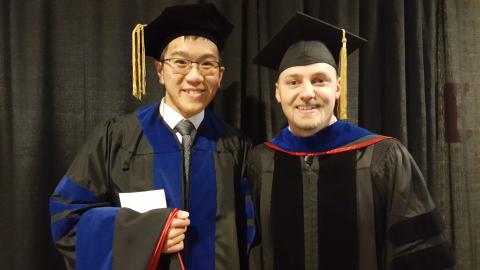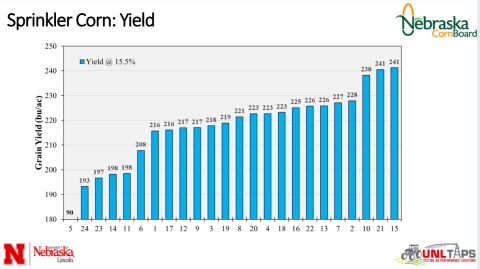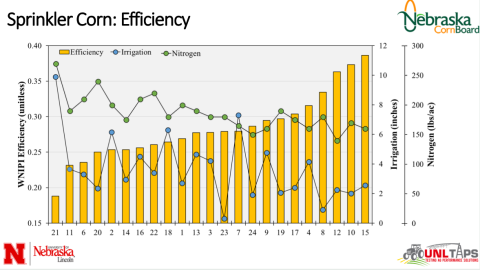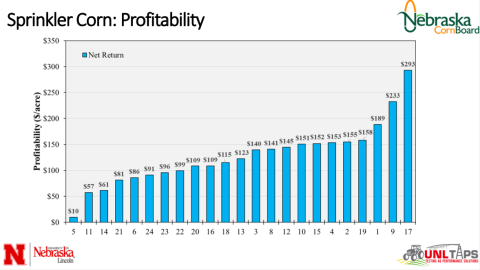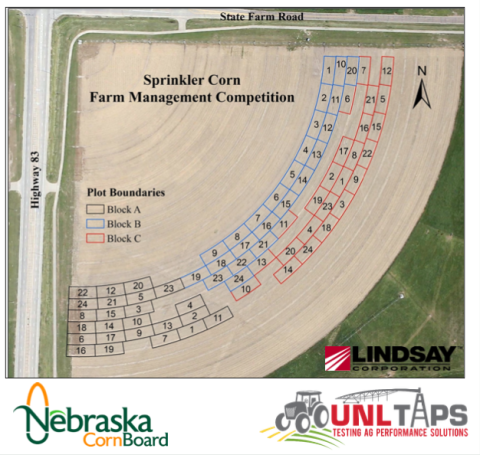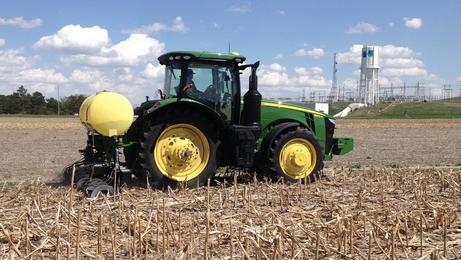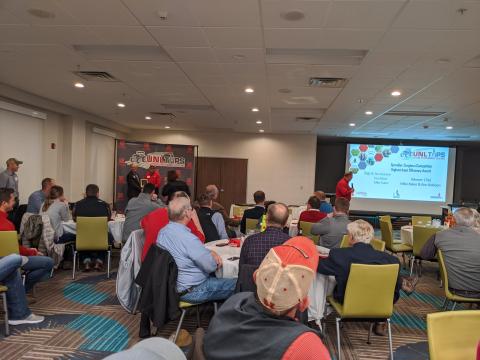Figure 1: The results of yield in the UNL-TAPS 2019 sprinkler corn competition
Figure 2: The results of input efficiency in the UNL-TAPS 2019 sprinkler corn competition
Figure 3: The results of profitability in the UNL-TAPS 2019 sprinkler corn competition
Like most of us, farmers love competition. In an era where increasing profitability and input use efficiency are the name of the game for successful producers, the Testing Ag Performance Solutions (TAPS) program has provided a new, innovative extension approach. TAPS provides farmers with unparalleled access to technology and research and an engaging learning experience they can then use to apply new concepts and integrate new strategies and tools on their operations.
TAPS participants compete to see who can be the most profitable and the most efficient with inputs, as well as who has the highest yield. The most profitable category is determined by how profitable producers are based on their marketing and the cost of their input use. Participants have access to a wide range of data throughout the growing season to inform their irrigation and nitrogen applications, including imagery, soil moisture probe and plant sensor data, and more. Competitors have control over choosing their seeding rate, crop variety, crop insurance, and marketing decisions — choices that are all made as if for a full-size operation of several thousand acres. With so many competing technologies available to choose from today, TAPS offers participants a no-risk opportunity to: try out many new technologies and their user interfaces throughout a growing season; push their input use efficiency more aggressively; and explore how to take advantage of marketing opportunities in new and different ways than they might typically do on their own operations.
Because TAPS participants’ decisions are documented and applied on randomized, replicated field plots, the data produced support research that is improving our understanding of how input timing and quantity impacts both productivity and profitability. Meanwhile, TAPS has also provided an invaluable professional development opportunity for several students and early-career researchers.
Tsz Him Lo (Himmy) on His Research and Experience Working with TAPS
Himmy Lo, while completing his graduate degree and working as a postdoctoral researcher at UNL, significantly contributed to the development and delivery of the UNL-TAPS program. Himmy’s research, supported in part by Ogallala Water CAP funding, has focused on variable rate fertigation and soil sensors to inform and manage water and nutrient application and improve input efficiency.
Lo shares the following:
“Through my research at UNL, I had the opportunity to acquire hands-on experience in field research as well as the opportunity to meet many wonderful people during my graduate and postdoctoral programs. I am very grateful for the guidance of my PhD advisor Daran Rudnick whose mentoring has benefited me tremendously. I conducted research on variable rate fertigation through center pivots and the use of sensors to measure soil moisture, plant canopy temperature, and plant canopy reflectance. Much of this work was integrated with the Testing Ag Performance Solutions program. Through the incorporation of my work into TAPS, variable rate fertigation served as a tool that contestants could use in their decisions on in-season nitrogen application. Throughout the season, various types of sensors were deployed to collect information for analyses of those and other decisions.
“Approaches to evaluating grower irrigation and fertilizer nitrogen amounts and timing” by Tsz Him Lo and co-authors lays out the process by which new indices of on-farm water and nitrogen input efficiency were created and adapted for the UNL-TAPS competition.
The intersection and interaction between irrigation and fertilizer management is something I’ve really been drawn to. I find that I enjoy working with complex problems. Managing water and nutrient inputs through technology in an efficient and profitable way, across varied soils and under different seasons, has a number of moving parts. Tackling these questions with the support of my advisors and through the TAPS program has been very enjoyable and a significant learning experience.
I think scientific advancement and understanding is critical to positive transformation in public mindsets, agricultural practices, and government policies. I hope my work can contribute to this, particularly for reducing or even reversing declines in groundwater levels in the Ogallala Aquifer and in improving rural vitality. God has given me a particular passion for rural prosperity and sustainable agricultural systems. Seeing present and future generations of farm families thrive is what has motivated my work and research. I look forward to seeing young professionals I’ve mentored continue to develop in their careers. I also look forward to seeing TAPS continue to flourish, and to spark fruitful changes in farming operations and to witnessing Nebraska agriculture continue to become more financially and environmentally sustainable.
In December 2019, I am pleased to say I have started as an assistant professor of irrigation engineering at the National Center for Alluvial Aquifer Research, which is a new joint operation between Mississippi State University Delta Research and Extension Center and USDA Agricultural Research Service. My time at UNL has equipped me with theoretical and practical knowledge of irrigation and with a first-hand perspective on agricultural extension. Combining this training with humility and an open mind to learn from local farmers, officials, and scientists, I will seek to understand the agricultural water challenges (i.e., flooding and groundwater depletion) of the Mississippi Delta and to partner with stakeholders to progress towards solutions.
Even though I have stepped away from UNL-TAPS, I look forward to seeing it continue to flourish and to spark further improvements in the financial and environmental sustainability of Nebraska agriculture. As for the students I have mentored at UNL, I look forward to seeing them become professionals who honor God in their careers and in all aspects of their lives.”
Growth and Development
Figure 4: The 2019 UNL-TAPS sprinkler corn competition randomized team plots
Figure 5: Application of fertilizer to 2018 UNL-TAPS sorghum competition
Figure 6: 2019 UNL-TAPS Banquet
Since its inaugural year in 2017, TAPS has expanded from a single competition for center pivot irrigated corn hosted at the West Central Research and Extension Center in North Platte, to a comprehensive competition which includes center pivot irrigated sorghum, subsurface drip irrigated corn, and dryland wheat. UNL-TAPS participants hail from across Nebraska as well as from Kansas and Colorado. Through connections forged via the USDA-NIFA funded Ogallala Water CAP between UNL’s Daran Rudnick and Oklahoma State University’s Jason Warren, a new TAPS program, OSU-TAPS, also launched in 2019 involving producers in the Oklahoma Panhandle.
Jason Warren on Starting OSU-TAPS
Warren shares the following:
“I started this program by just calling up a bunch of farmers saying, ‘Hey can you help me beta test this new project? I’ll call you and text you every week and ask you how much water and fertilizer you want’, and they said, ‘Yeah, I’ll do it.’ We have a very small community of irrigators in the [Oklahoma] Panhandle and the ones we’re working with, they’re really “tip of the sword” in using advanced technology. With this program we can add to their knowledge, even with technology they’re already using.
Through TAPS, participants can compare treatments and tools and get to learn more about how technology works instead of just looking at pretty pictures of aerial imagery or just hoping their soil moisture sensors work. Even these good producers that are progressive in their technology and adoption can learn in this setting [and figure out what they] might be willing to pay for on their farm [of several thousand acres].
Through TAPS, we’re not just reaching producers, but we’re reaching their crop consultants as well. It’s important to remember, the farmer isn’t just growing the crop, he’s marketing the crop. In some cases, he’s more of a businessman than an agronomist, and it’s his crop consultant that you really need to get to.
TAPS also creates a direct avenue to engage with the technology providers. Today, I visited with a Lindsay Irrigation regional representative and told him about some of the issues that we’re having [on the pivot we’re using for the TAPS competition]. It’s important to have our equipment work for the participants who are competing. Technology and equipment dealers are more than happy to help us, because they are getting their product exposed, and because I’m teaching people how to use it.”
Starting Conversations
TAPS has created a space for stakeholders to be part of a community engaged in conversation and inquiry to advance agricultural management in light of very complex and dynamic agricultural challenges. Regulatory agencies such as the Nebraska Department of Environment and Energy team (2018 winners for the most profitable farm award) shared how TAPS made them actively aware in a way they had not yet been to the many questions and challenges producers face every growing season.
TAPS also supports shared inquiry and insights among producers and other participants. Normally, another producer’s decisions are a mystery. What TAPS encourages through friendly competition is opportunity for people to talk about what many are thinking about all the time: the “how” and “why” of the countless decisions that are made during a growing season and which ones make a difference, particularly in terms of profits, but also in terms of resource use efficiency which is subject to ever more scrutiny. By sharing decisions and results through TAPS in a risk-free environment, competition drives shifts in thinking, management, and farming culture that can help sustain agriculture dependent on the Ogallala Aquifer resource.
Takeaways
The 2017, 2018, and 2019 UNL-TAPS competitions have generated several key insights. One significant takeaway is the importance of marketing in determining the competition’s outcome. Marketing isn’t everything, but for those who are great managers, if they engage in effective marketing, they are bound to be profitable. Perhaps not too surprisingly, another significant takeaway is that the highest yielding teams in the competition weren’t necessarily the most profitable or most efficient. In fact, many participants expressed appreciation for how TAPS has supported their shift in mindset to focus on improving efficiency and profit rather than focusing on improving yields.
“The thing that is good about TAPS is the technology — just about everything you could imagine is there and offered which you could use and you don’t have to pay with it on your own farm and can experiment. I’ve experimented with the nitrogen side of it and have cut back on pounds per bushel, and it’s been a good learning experience.” -Producer, Gothenburg, NE
“We’ve darn sure learned a lot, that it’s not all about trying to grow the biggest yield, and really learned how important the marketing is. You can grow a big yield and survive, but growing a smaller yield and being more efficient with better marketing will let you [keep] more dollars.” -Producer, Hershey NE.
Another important aspect of TAPS is how the program engages extension researchers and educators in fostering exchange among producers, technology providers, and others. This exchange enables everyone’s expertise to be fused and shared with a broad audience, serving and reaching more people than traditional extension programs. Sharing TAPS results throughout the Ogallala region and beyond has inspired conversations and new collaborative efforts that continue to grow.
Further Growth and Development
In late 2019, TAPS was awarded a USDA-NRCS Conservation Innovation Grant, which provides three years of funding to help support existing TAPS programs in Nebraska and Oklahoma, as well as lay the groundwork for the creation of new TAPS programs in Colorado and Kansas.
Research takeaways from the 2019 sprinkler corn TAPS competitions in Nebraska and Oklahoma were recently featured at the Central Plains Irrigation Conference in Burlington, CO, on February 18-19, 2020. To read the proceedings article and see data generated from the competitions, visit: https://www.ksre.k-state.edu/irrigate/oow/p20/Rudnick_20.pdf

